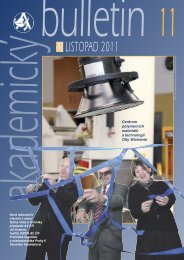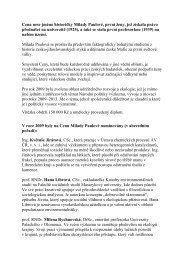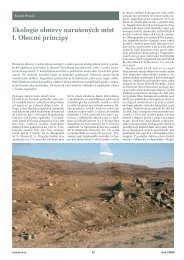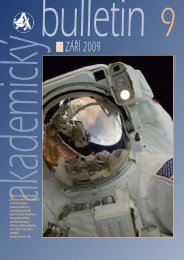Sestava 1 - Akademický bulletin - Akademie vÄd ÄR
Sestava 1 - Akademický bulletin - Akademie vÄd ÄR
Sestava 1 - Akademický bulletin - Akademie vÄd ÄR
- No tags were found...
Create successful ePaper yourself
Turn your PDF publications into a flip-book with our unique Google optimized e-Paper software.
e s u m éACADEMY ASSEMBLYThe Academy Assembly, the Academy of Science’s highest bodyresponsible for the most important decisions related to the ASCR, heldits XL meeting April 19, 2012. Among invited guests were Petr Fiala,the Prime Minister’s Chief Science Advisor; Miroslava Němcová,Chairwoman of the Chamber of Deputies of the Parliament of theCzech Republic; Alena Gajdůšková, First Vice-President of the Senateof the Parliament of the Czech Republic; Václav Pačes, President ofthe Learned Society of the Czech Republic; Rudolf Zahradník, ASCRHonorary President; Helena Illnerová, ASCR former President andothers. This meeting’s main agenda item was discussion of theresearch methodology evaluation, which has been criticized by theASCR since its inception. According to the Jiří Drahoš, the Presidentof the Academy of Sciences of the Czech Republic, the allegedmisconceptions of the prevailing methodology were highlighted inthe final report of the project International Audit of Research andDevelopment in the Czech Republic, compiled and published bya consortium of renowned foreign institutions. Another item of themeeting was a brief presentation of the Strategy for the Developmentof the ASCR 2014–2020, in which Professor Drahoš introduced keyvisions and medium-term developmental goals of the ASCR, theCzech Republic’s leading non-university public research institution.FOREIGN AFFAIRSScientific Cooperation with Mexico and South AmericaAnother article features the scientific cooperation between theAcademy of Sciences and several institutions in Mexico, Peru,Argentina and Brazil, which plays a pivotal role in the administrationof a wide spectrum of scientific and academic programs. Under theAgreements with these institutions, specific programs of cooperationare carried out in various areas.Indická delegacev Akademii věd ČRMístopředseda <strong>Akademie</strong> věd ČR Miroslav Tůma přijal 20. dubna2012vbudově <strong>Akademie</strong> věd na Národní třídě v Praze delegaciÚřadu pro vědu a technologie Indické republiky spolu s velvyslancemIndické republiky v Praze J. E. V. Ashokem. Během návštěvy seúčastníci mj. vrátili k tématu vybudování společné laboratoře, o nížv loňském roce s indickými delegáty diskutoval předseda AV ČR JiříDrahoš.„Předchozí indicko-česká spolupráce byla založena na určitém cíli,ke kterému se můžeme přibližovat. Nebyly však definovány postupnékroky, které jsme si přiblížili na dnešním jednání,“ uvedl M. Tůma.Úřad pro vědu a technologie Indické republiky se orientujepředevším na informační technologie a komunikace. Podle místopředsedyAV ČR jde o obor, který sice má v Akademii své základy,ovšem postrádá výsledky neboli návaznost na technologie. „Tímtosměrem bychom proto měli výzkum směřovat. Je třeba se dohodnoutna postupu a konkrétně určit, jaké jsou možnosti spolupráce,či případně uspořádat společný workshop,“ dodal M. Tůma.<strong>Akademie</strong> věd spolupracuje s Indií již mnoho let – od roku 1986smluvně s Indickou národní vědeckou akademií, od roku 1995ab40SCIENCE AND RESEARCHMarie Curie Actions opens its call for individual fellowshipsThe Marie Curie Actions opened its call for the individualfellowships (International Outgoing Fellowships; International IncomingFellowships and Intra-European Fellowships). Those fellowships areopen to experienced researchers (with a Ph.D. degree or four years ofresearch experience) who desire to pursue their research projects inanother country (be it within or outside Europe). Researchers fromany field of research, nationality or gender are invited to submit theirapplication by August 16, 2012.FROM BRUSSELSKey Enabling TechnologiesThe CZELO Office in Brussels organized an IGLO Open Seminaron Key Enabling Technologies (KETs) on March 6, 2012. The KETsrepresent an important feature of the upcoming Horizon 2020framework program. Their role is to enhance the competitiveness andinnovation potential of European products, processes and technologies.The KETs are defined, for example, as micro- and nanoelectronics,photonics, biotechnology or advanced manufacturing systems.The Academy of Sciences hosted an Indian delegationMiroslav Tůma, Vice-president of the Academy of Sciences, metwith representatives of the Department of Science & Technology ofthe Republic of India and the Ambassador of India, Mr. V. Ashok,April 20, 2012 at the ASCR headquarters. The ASCR continues tocollaborate with two Indian science institutions, the Council ofScientific and Industrial Research of India and Indian NationalScience Academy. This scientific cooperation is open to all institutesof ASCR associated in the Division for Mathematics, Physics andEarth Sciences and in Division for Life and Chemical Sciences.Zleva: vrchní ředitel sekce mezinárodní spoluprácez Úřadu pro vědu a technologie Indické republikyArabinda Mitra, velvyslanec Indické republikyJ. E. V. Ashok a hlavní vědecký poradce z Úřadu pro vědua technologie Indické republiky Jagdish Chander.s Radou pro vědecký a průmyslový výzkum. V obou případech jdeo spolupráci v oborech, jimž se věnují ústavy I. a II. vědní oblasti.Společná témata existují v oblastech matematiky, fyziky, informatiky,věd o Zemi, chemických věd, biologických, lékařských a biologicko-ekologickýchvěd.■srdFOTO: STANISLAVA KYSELOVÁ, AKADEMICKÝ BULLETIN
















